Review: Imperfect, yes, but ‘Jelly’s Last Jam’ is still wildly entertaining in Pasadena revival
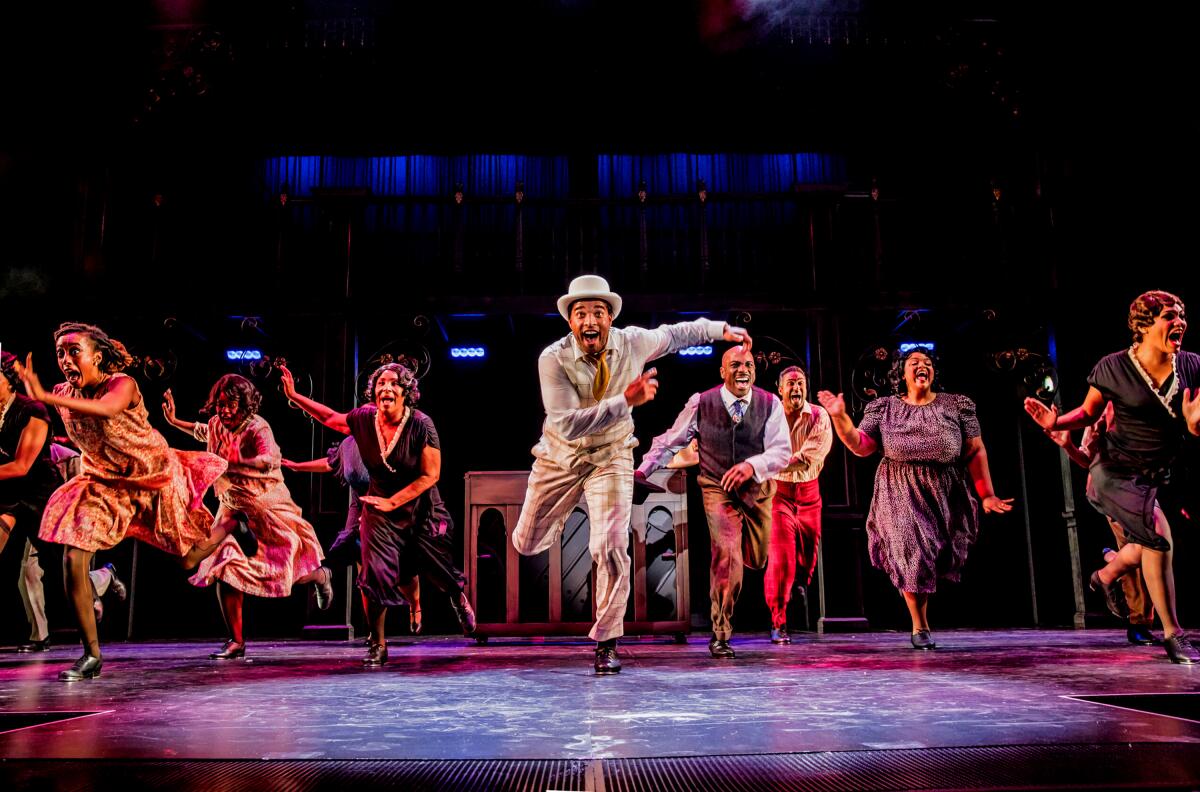
- Share via
Pasadena Playhouse has become the best place in town to see a musical. The theater is big enough to give a show breathing room but intimate enough to allow an audience proximity.
Most regional theaters of this scale have given up on trying to produce major musical offerings. The orchestra alone would break most budgets, never mind the murderous expense of large casts and elaborate sets.
But Pasadena Playhouse somehow manages to persevere. In recent seasons, it has delivered a fresh take on “Little Shop of Horrors” and served up two glorious revivals in its Sondheim Celebration, “Sunday in the Park With George” and “A Little Night Music.”
On stage now with a 10-piece orchestra is “Jelly’s Last Jam,” the musical about one of jazz’s founding fathers, Jelly Roll Morton. With a book by George C. Wolfe and lyrics by Susan Birkenhead, the show tells Morton’s story through his music. The score by Morton, adapted by Luther Henderson, who composed additional material, confides his spiritual biography.
One of the conceits of the musical is that not only Morton’s personal suffering but the history of his people’s suffering — a history that he kept aloof from — is encoded in the music. “Jelly’s Last Jam” begins at the end, with Morton’s body lying on a coroner’s slab, and works backwards, offering a life in review, a moral autopsy , if you will.
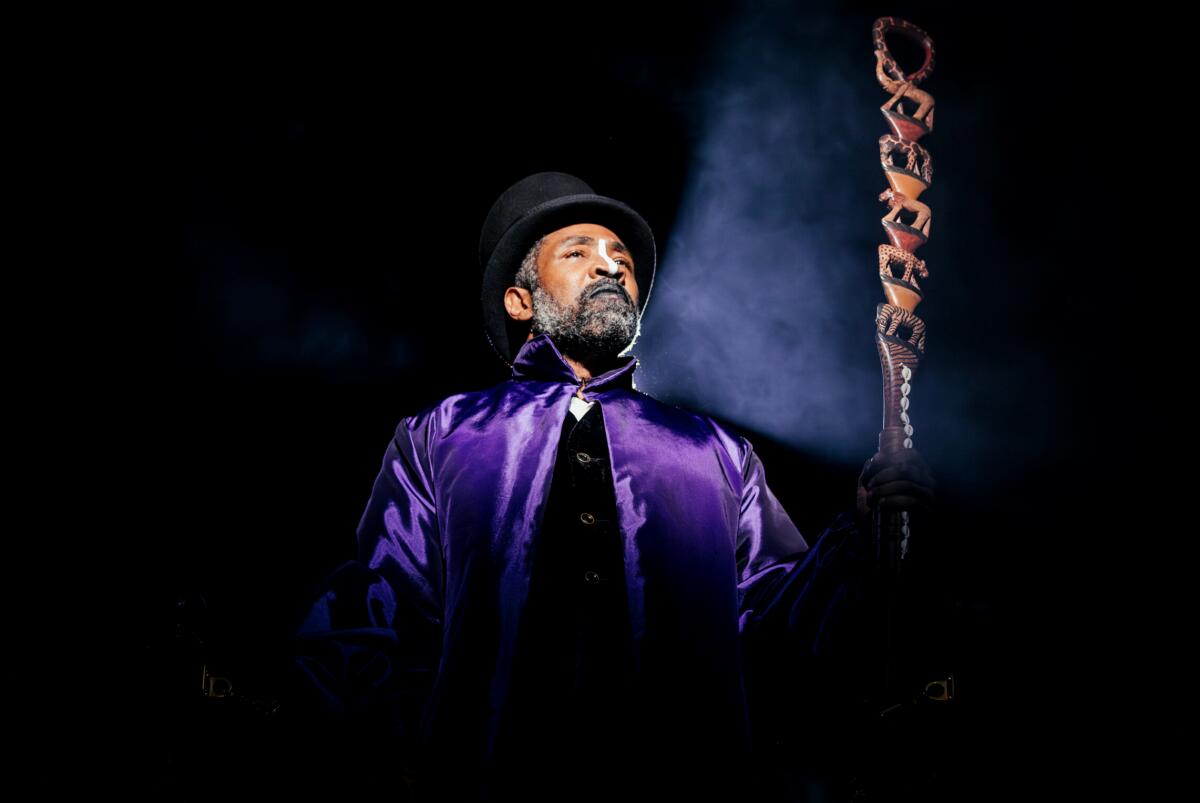
Chimney Man (Cress Williams) is the figure who guides Jelly (John Clarence Stewart) through this postmortem reckoning with his past. He asks Jelly to think of him as the doorman or concierge to his soul as he leads him to confront in death what he evaded in life — the pain he experienced and the pain he caused.
At a time of widespread retrenchment in American theater, Danny Feldman is boldly experimenting in real time at Pasadena Playhouse.
“Jelly’s Last Jam,” which premiered at the Mark Taper Forum in 1991, marked the emergence of Wolfe as one of the mighty creative forces in the American theater. His play “The Colored Museum” had already established him as a playwright of tremendous daring.
In “Jelly’s Last Jam,” Wolfe proved he could be just as innovative with a musical. What set him apart as writer-director was the way he combined electric showmanship with biting political critique.
The musical, which had its Broadway premiere in 1992, catapulted Wolfe into the upper ranks of Broadway directors. But what no one who saw this production will ever forget is the dazzling Tony-winning performance of Gregory Hines in the title role.
Hines was a marvel, not just with his fevered tap dancing and supple singing but with the sensitivity of his characterization. His Jelly had the heartfelt charisma to withstand the brunt of Wolfe’s harsh interpretive scrutiny.
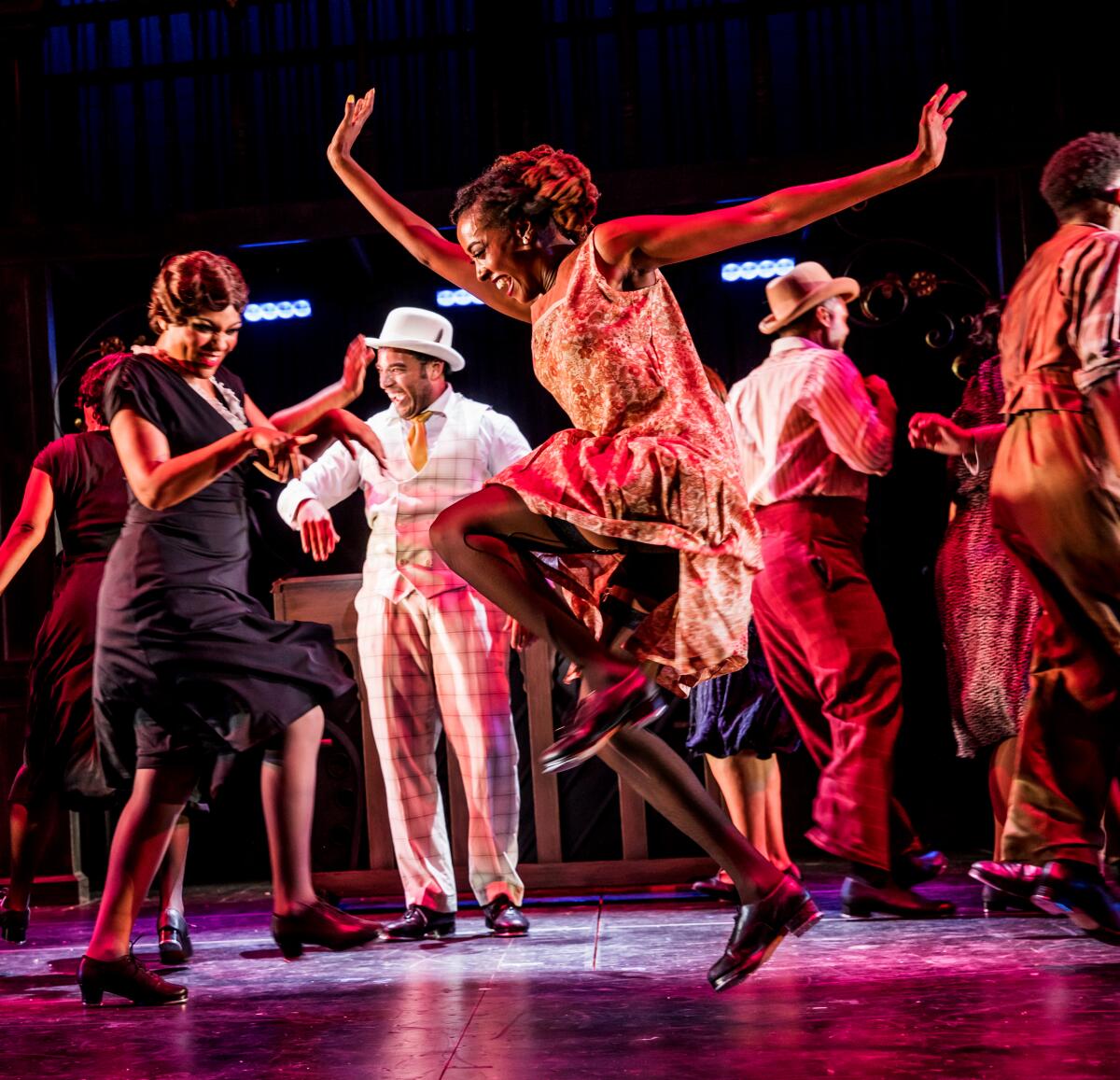
Although ahead of its time in many respects, “Jelly’s Last Jam” hasn’t had a revival on Broadway. The reasons aren’t hard to find. It’s a big show and a costly one. But more consequentially, it still has the feeling of a work-in-progress, a musical oozing with potential but still a few drafts away from its ideal form.
All the more reason, then, to be grateful to Pasadena Playhouse for producing this revival of “Jelly’s Last Jam.” The musical is historically noteworthy even if it falls short of classic status. (An Encores! concert staging was well received earlier this year at New York City Center.) But more to the point, the musical abounds in theatrical riches that are on brilliant display in this production, directed by Kent Gash.
The energy of the staging sweeps you along even when the storytelling gets blurry or, in its final stage, predictable. Stewart’s Jelly is not sentimentalized. He’s the strutting, arrogant, trouble-making peacock everyone says he is.
Jelly is the first to attest to his own musical genius. He claims that he invented jazz, a point that when disputed enrages him. As a primer on his musical achievement, the show relies a lot on hearsay. We enjoy what we hear, but a deeper understanding of the music wars of the time and the rivalries with other jazz trailblazers are treated superficially.
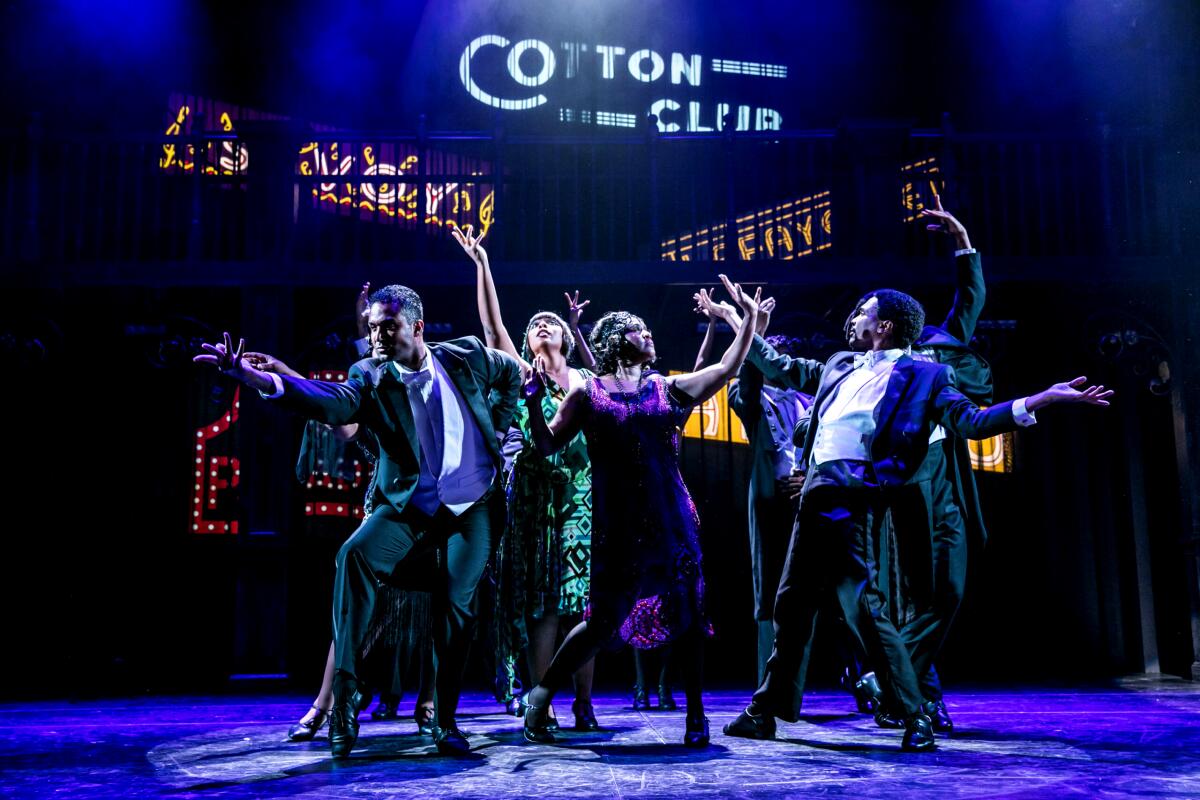
The pain Jelly would rather deny is communicated in everything he can’t say — in what he refuses to acknowledge even to himself. Stewart conveys this repression physically, through a defensive crouch that uncoils when under attack. His bombast and braggadocio betray a subtle flinch. Jelly is only truly free when at the piano, making music in a way no one has ever done before.
Stewart doesn’t charm us through sheer virtuosity in the way Hines was able to do. But he gives passionate embodiment to Jelly’s wounds.
Wolfe positions Jelly as a race traitor, who denies his Black roots but whose music tells the full story of his origins. Born to a New Orleans Creole family, he was raised in a musically sophisticated household, where French opera was revered but the lure of the blues floated temptingly just outside his front door.
The traumatic event of Jelly’s early life was his banishment by his grandmother, Gran Mimi (Karole Foreman), after she discovered he was jamming with musicians at a brothel and doing God only knows what else there. Music led him to culturally cross over, but the conflict within his racial identity was established after Gran Mimi slapped him upside the head and told him “You are not Creole!”
What follows are musical snapshots of an artist, who on the lam from himself, hones a style that will forever change the landscape of modern music. On the road, Jelly pairs up with Jack the Bear (Wilkie Ferguson III), and together they careen through a blur of dodgy nightspots and underworld dens, each requiring a hasty exit after Jelly starts running his mouth.
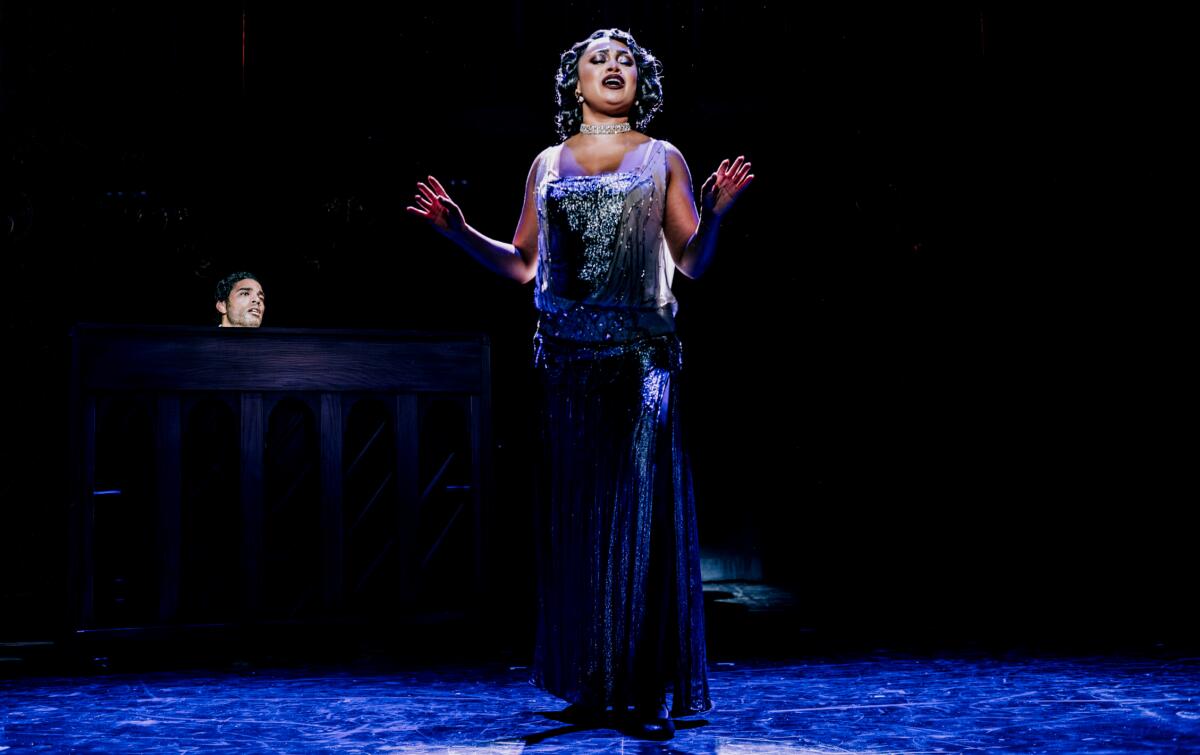
The staging, which can seem cluttered and breathless in the early going, traipses through these seedy locales with a theatrical swiftness that captures the milieu that bred the syncopated rhythm of the Jazz Age. (Edward E. Haynes Jr.’s scenic design, Rui Rita’s lighting, Samantha C. Jones’ costumes and Dell Howlett’s choreography create a series of fluid tableaux, part motion picture, part nightclub whirl.)
Jelly eventually meets his match, in every sense, in Anita (Jasmine Amy Rogers). She’s a singer who is as confident as he is cocky. The music they make together is sublime. (Rogers bewitches with her singing in a knockout performance.) “Jelly’s Last Jam” is most alive in their tumultuous love story.
What makes the relationship special from a theatrical standpoint isn’t so much Jelly and Anita’s suitability for each other. (Jelly isn’t ready for her.) It’s Anita’s emotional heft. She’s a worthy antagonist for Jelly, who until now has been shadow-boxing with sketchy ghosts. Anita forces him to confront the emptiness he’s been fleeing his entire life.
The second act of “Jelly’s Last Jam” plays like an outline that hasn’t been filled in. The show’s supernatural frame involving Chimney Man feels more and more like a cheat. The epiphanies that occur via this pathway come cheaply.
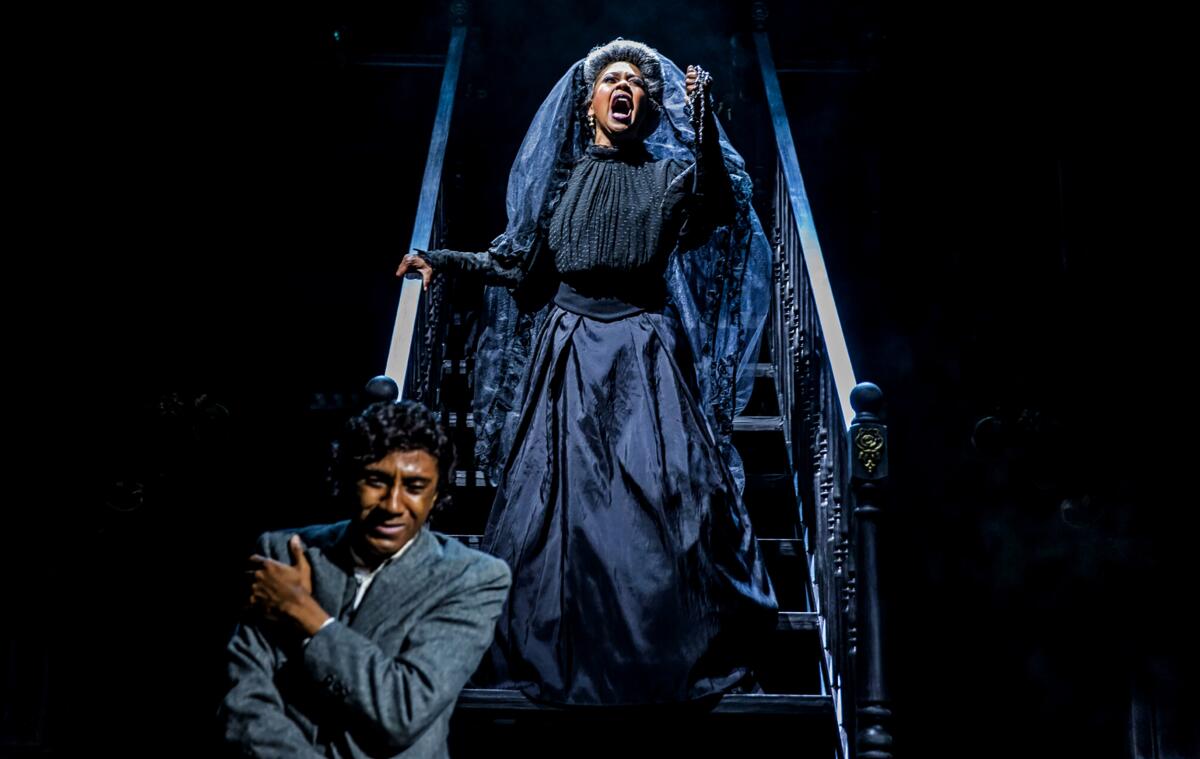
The most thrilling moments of the first half involve the thunderous tap dancing between Jelly and his younger self. (A soaring Doran Butler imbues Young Jelly with an endearing grace.) But sometimes the production tries to mask the problems of the book with empty theatrical pizzazz. The minstrel-inflected “Dr. Jazz” number that closes the first act is given a little too much Vegas oomph.
“Jelly’s Last Jam” is an imperfect show, but a wildly entertaining one. It’s a significant American musical that needs an overhaul that only the authors could provide. Morton certainly deserves it. There’s a deeper knowledge base of his music since the show was written. (The 1992 Broadway musical helped launch discoveries of his oeuvre.)
Wolfe offers an interpretation of an artist that is bracing in its political boldness yet ultimately seems too narrow. But what a vibrant, muscular musical, and how lucky for us that Pasadena Playhouse has undertaken to remind us of its treasures.
'Jelly's Last Jam'
Where: Pasadena Playhouse, 39 S. El Molino Ave., Pasadena
When: 8 p.m. Tursdays-Fridays, 2 and 8 p.m Saturdays, 2 p.m Sundays. (Check for exceptions.) Ends June 23
Tickets: Start at $44
Contact: (626) 356-7529 or PasadenaPlayhouse.org
Running time: 2 hours, 30 minutes
More to Read
The biggest entertainment stories
Get our big stories about Hollywood, film, television, music, arts, culture and more right in your inbox as soon as they publish.
You may occasionally receive promotional content from the Los Angeles Times.












